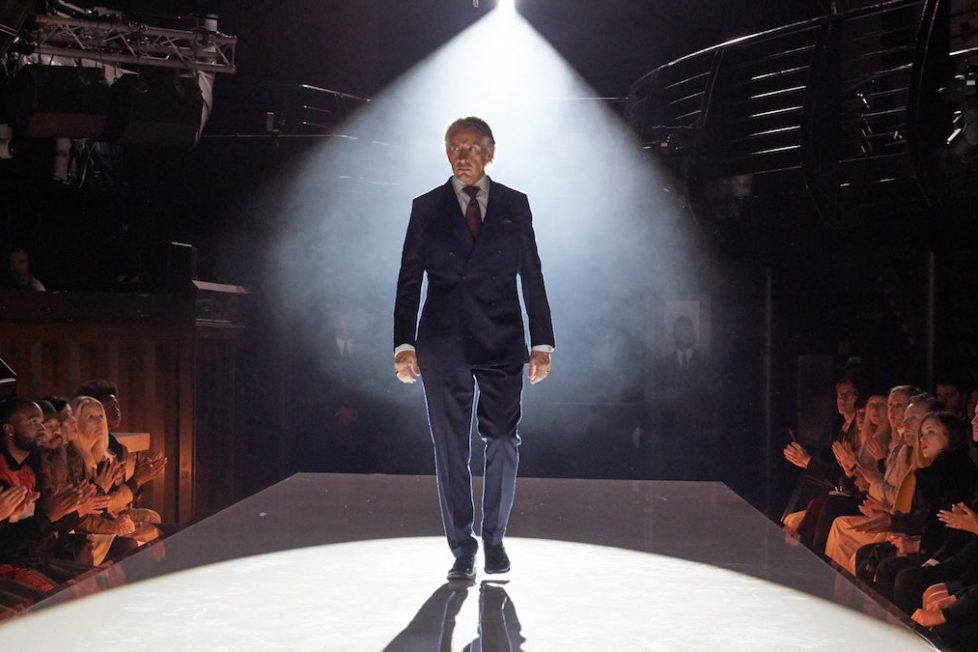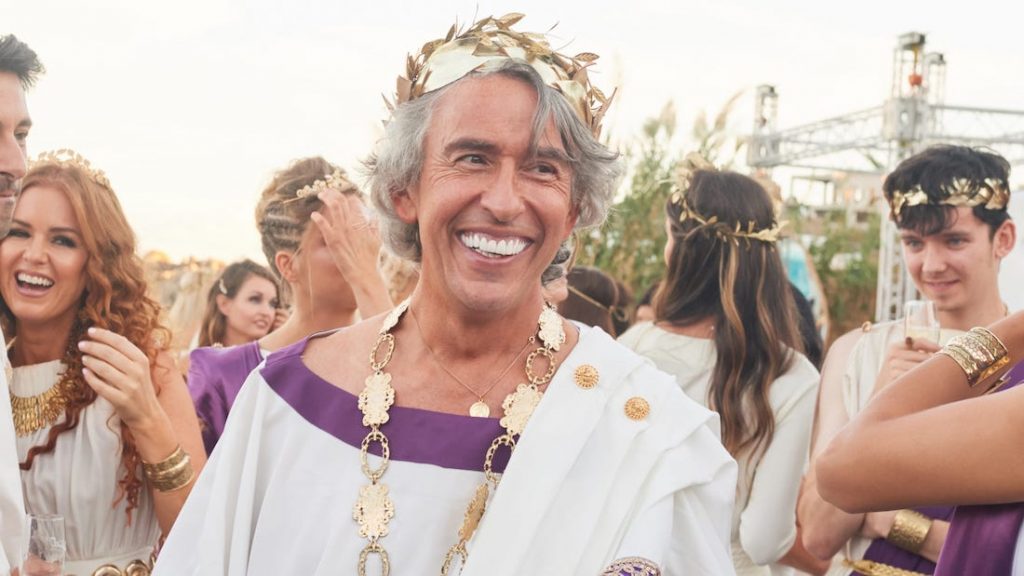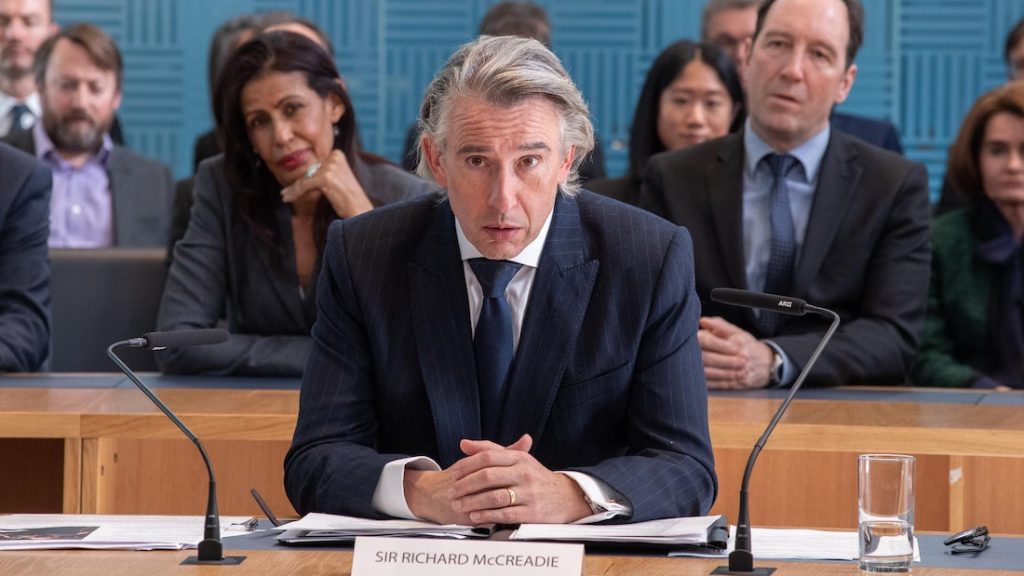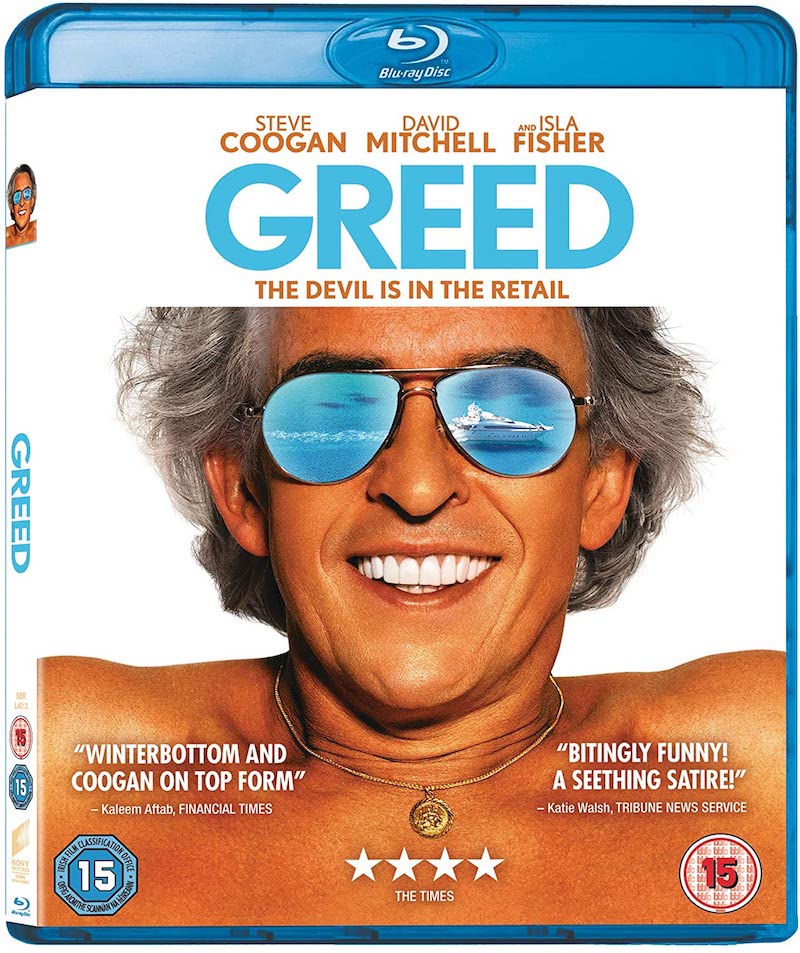GREED (2019)
Satire about the world of the super-rich.


Reviled retail magnate Sir Richard “Greedy” McCreadie (Steve Coogan), his family, and his closest staff, have gathered on the Greek island of Mykonos to organise his 60th birthday celebrations, complete with celebrity guests and Gladiator-themed entertainment. One of his cadres is his official biographer, whose interviews and research pepper the narrative, providing the context of his life and the wider impact of his business dealings. As we progress simultaneously through the build-up to the party, and through a potted history of his career, McCreadie barrels like an out-of-control trolly car towards his fate.
The problem with Greed is that it’s really two films, mercilessly and often jarringly dovetailed together. These two films perhaps represent the two halves of co-writer/director Michael Winterbottom. The first movie, the one you’ve probably seen in the trailers, is co-written and directed by the Michael Winterbottom who made The Trip and A Cock & Bull Story, focusing on McCreadie and his team’s hapless preparations for his party and the peripheral chaos of his dysfunctional family. We’re treated to short comic sketches as Tim Key struggles to project-manage the building of a replica Roman amphitheatre, or Asim Chaudhry tries to impress McCreadie with the lacklustre lion that’ll feature in the entertainment.

Isla Fisher turns up as McCreadie’s brash ex-wife and owner of his companies, Shirley Henderson plays his proud Irish mother, Asa Butterfield appears as his unloved and resentful son, and Sophie Cookson plays his reality-star daughter who finds it difficult cope with the distinctions between reality and “scripted reality”. And, last but not least, there are Syrian refugees living on the beach that McCreadie’s exclusive party will overlook, who play into the plot in insubstantial ways. All of this feels semi-improvised, even if it wasn’t, and that results in a film that’s wildly unfocused. We’re “treated” to a catalogue of uncharming and desperate narcissists in a series of frequently amusing, although never hilarious, skits. The editing is brisk, scenes rarely running longer than a minute, and gives the unavoidable impression that there wasn’t much good stuff to work with.
The second film that comprises Greed focuses on McCreadie’s rise, as seen through the narrative device of his authorised biographer Nick’s (David Mitchell) interviews with those that knew him when he was young and starting out in business, and McCreadie’s appearance at a parliamentary select committee. This potted history section is directed by the Winterbottom of 24 Hour Party People (2002) and The Look of Love (2013), and sometimes seems to aim for the tone of The Big Short (2015), with handily simplified explanations of how McCreadie was able to buy his retail empire with borrowed money, siphoned profits to his Monaco-domiciled wife, running up massive debts, and then declare the company bankrupt. “Classic asset-stripping” as a financial journalist explains to Nick, the writer slowly understanding the callous horror of McCreadie’s empire. Added to this are Nick’s visits to the sweatshops that make the clothes for McCreadie’s fashion brands. These scenes are directed by the documentarian Winterbottom, and it’s these that have the most heft, largely because they’re the only parts of the film that feel genuine and uncaricatured.

These two films start to combine at the one-hour mark, coalescing around the characters of McCreadie, Nick, and a member of McCreadie’s staff, Amanda (Dinita Gohil). Amanda’s mother used to work in one of McCreadie’s sweatshops and now she finds herself dressed as a Roman slave for his party. Nick and Amanda are the only characters suffering a crisis of conscience and, for that reason, the film is effortlessly engrossing whenever they’re on-screen in a way sorely lacking up to this point.
Mitchell gives his normal charmingly awkward performance, and Gohil quietly gives the best performance of the film. Talking through the story, it should have become blindingly obvious to all involved that they (and Amanda especially) should be the focus of the film. McCreadie could have been kept as a shadowy off-screen figure, larger-than-life. But no, Coogan is given ample opportunity to bring him to life, so let’s discuss him…
McCreadie is a one-note arsehole. He cares only for himself and for money. He’s a “dealmaker”, so we know he’s bad news, and the film portrays him as an obscene, rude, vulgar, and vain bully from the beginning. In the hands of Steve Coogan, such a character seems ripe for comic potential, except there’s none of the vulnerability of Alan Partridge, Coogan’s most famous narcissist creation, and thus nothing to engage audiences.

The real problem is the film’s obvious connection to real-life bastard Philip Green, as “Coogan plays Philip Green” was too overwhelming a pitch for anyone to turn down. Winterbottom and Coogan clearly hate Green as much as we all do (and rightly so) and have piled all that hatred into the McCreadie character, to the point where they can’t find the ability to make us sympathise, or even empathise, with him. McCreadie smothers the film, and yet we gain greater insight into the administration of his businesses than we do into the man himself.
Threaded through all of this is McCreadie’s love for Ridley Scott’s Gladiator (2000) and, by extension, Roman Emperors. He sees himself as an Emperor of business and the film uses this comparison as a sledgehammer to hit the audience over the head once again with his hubris, vanity, and to foreshadow his ultimate fate. It’s a metaphor that’s so heavy-handed and yet never works because what should be a unifying concept is just one more idea added to the mix.
When the disparate journeys of McCreadie, Nick, and Amanda combine in the final 20-minutes, Greed comes to life… but it can’t be a good thing when the informative text that accompanies the end credits is more arresting than anything that took place over the previous 90-minutes. Winterbottom seems to have had twenty different ideas about how to tackle a fictionalised Philip Green and, rather than focus on the best one, he attempted to pack them all into one film. It’s a bewildering and unsatisfying approach; tonally inconsistent and sometimes grating. But, when the film can tear itself away from gawping at the vulgarity and superficiality of it all and focus instead on the little people caught under McCreadie’s wheels, it lands some blows.
UK | 2019 | 104 MINUTES | 2.39:1 | COLOUR | ENGLISH


The Blu-ray of Greed didn’t reach us in time for review, due to the COVID-19 pandemic, but the bonus material on the disc is as follows:

writer & director: Michael Winterbottom.
starring: Steve Coogan, David Mitchell, Isla Fisher, Ollie Locke, Sophie Cookson, Shirley Henderson, Pearl Mackie & Asa Butterfield.
